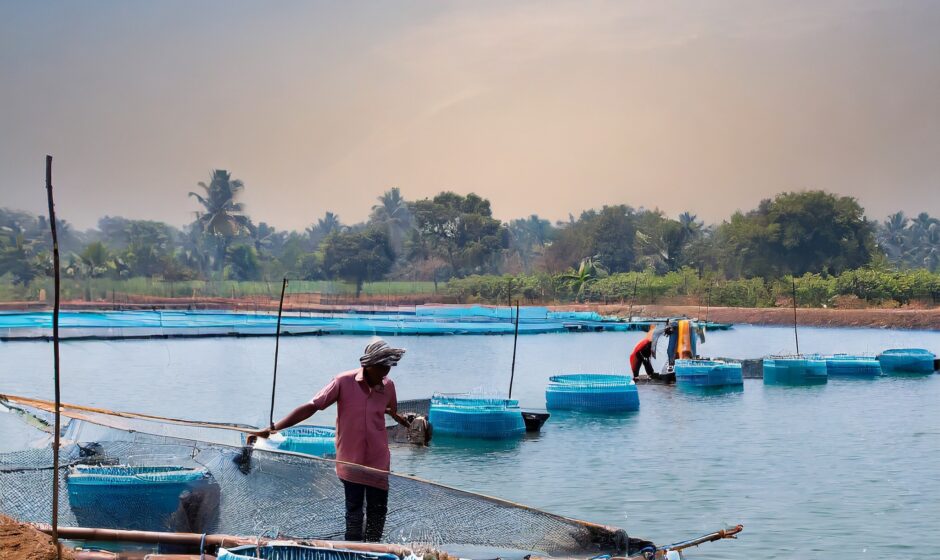March 29, 2023, marked a pivotal moment for India’s coastal aquaculture sector with the introduction of the Coastal Aquaculture Authority (Amendment) Bill, 2023. This significant piece of legislation aims to reshape the industry’s landscape, promising a wave of positive changes that will impact everything from farmer empowerment to environmental responsibility and, ultimately, the seafood on our plates.
Casting a Wider Net: Expanding the Definition of Coastal Aquaculture
One of the fundamental changes proposed by the Bill lies in its broadened definition of coastal aquaculture. Moving beyond its traditional focus on shrimp and prawn farming, the amendment now encompasses the cultivation of a wider range of aquatic life under controlled conditions. This includes fish, crustaceans, molluscs, finfish, seaweed, and others, opening doors for the development of diverse and potentially more sustainable aquaculture practices.
Promoting Environmentally Friendly Solutions: A Focus on Biosecurity and Innovative Techniques
Recognizing the importance of environmental responsibility, the Bill places a strong emphasis on fostering sustainable practices within the industry. This is achieved through several key measures, including:
Promoting newer forms of environmentally friendly aquaculture: Cage culture, seaweed culture, bi-valve culture, marine ornamental fish culture, and pearl oyster culture are highlighted as promising areas with the potential to create employment opportunities and minimize environmental impact.
Establishing facilities for improved broodstock and seed production: Access to clean seawater will be crucial for facilities producing genetically improved and disease-free broodstocks and seeds, ultimately leading to healthier and more resilient aquaculture units.
Enhancing biosecurity: New provisions focus on preventing the spread of harmful organisms and diseases within aquaculture units. This includes the establishment of specialized centers that adhere to strict biosecurity protocols, ensuring the long-term health and sustainability of the sector.
Shifting Gears: Decriminalization and a New Regulatory Landscape
Marking a significant shift in approach, the Bill proposes to decriminalize certain offences related to coastal aquaculture activities. Instead of relying on penal measures, a system of fines and penalties will be implemented, accompanied by the authorization of specific officers to enforce these regulations. This move aims to streamline the regulatory framework, encourage compliance, and create a more business-friendly environment.
Empowering the Authority: Increased Responsibilities and Enhanced Capacity
The Coastal Aquaculture Authority will play a more prominent role under the proposed amendments. New responsibilities will include:
Setting standards for inputs and discharges: This will ensure that aquaculture activities do not negatively impact the surrounding environment.
Monitoring and regulating activities: The Authority will have increased oversight over the industry, ensuring compliance with regulations and best practices.
Prohibiting the use of harmful substances: The use of antibiotics and other potentially harmful substances will be prohibited to protect human health and the environment.
* **Appointing officers**: The Authority will be able to appoint officers with specific powers and functions, strengthening its administrative capacity and effectiveness.
Building on the Past: A Legacy of Regulatory Evolution
The Coastal Aquaculture Authority (Amendment) Bill, 2023, isn’t the first attempt to modify the existing regulatory framework. In 2022, a similar bill was proposed, paving the way for the current amendments. While the 2023 Bill builds upon its predecessor’s foundation, it introduces new elements and modifications, reflecting the evolving needs and challenges of the aquaculture sector.
Navigating the Future: A Sustainable Course for Indian Aquaculture
The Coastal Aquaculture Authority (Amendment) Bill, 2023, holds immense potential for the future of Indian aquaculture. By promoting ease of doing business, encouraging sustainable practices, and empowering the Coastal Aquaculture Authority, the proposed amendments can contribute to a vibrant and responsible industry that thrives in harmony with the environment.
However, success hinges on effective implementation and ongoing collaboration between stakeholders. Farmers, scientists, government officials, environmental groups, and industry professionals must work together to ensure that the Bill’s potential is fully realized. By prioritizing both economic development and environmental protection, the Indian aquaculture sector can navigate the challenges and opportunities that lie ahead, charting a course towards a sustainable and prosperous future.
This legislation marks a turning point for the Indian aquaculture industry. As we move forward, it is crucial to remain vigilant and committed to sustainable practices, ensuring that the future of Indian aquaculture is as bright as the waves that nourish it.

